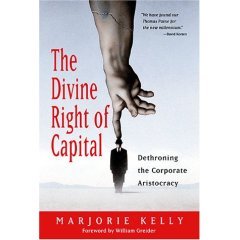The End of Democracy
 Here's my review of "The Divine Right of Capital: Dethroning the Corporate Aristocrac" by Marjorie Kelly which I posted on Amazon in November, 2001. I was so taken with her analysis that I wrote Ms. Kelly a fan letter to which she graciously responded.
Here's my review of "The Divine Right of Capital: Dethroning the Corporate Aristocrac" by Marjorie Kelly which I posted on Amazon in November, 2001. I was so taken with her analysis that I wrote Ms. Kelly a fan letter to which she graciously responded. I encourage you to click on the title link above which will take you to my review and others on Amazon. Read the one star reviews for a quick course on the brittle neo-liberal defenses of corporate power, where Ms. Kelly is charged with being a Marxist, with stupidity, with arrogance: all the usual names that are trundled out by the true believers in the corporate creed in response to Ms. Kelly's thoughtful, undogmatic insights into the anti-democratic ethos of the corporatist state.
Here's my review:
THE NEW FEUDAL STATE, November 19, 2001
I was thrilled with Marjorie Kelly's extended analogy of the corporate state as the last bastion of feudal state (and the belief system which upheld it, i.e., the great chain of being, the divine right of kings, etc.). In her introduction, Kelley warns us that she may overuse the analogy -- but really, it's not possible. Nor is the analogy of the American Revolution as a revolution against a regime which saw Americans as colonials (and thus with limited rights -- as England "owned" us, our energies and the goods we produced).
The feudal metaphor explains the queasy feeling most workers get when their advice is solicited in quality circles (it's because its like we're being patronized by the nobles, who are only asking us how we feel to have more effective dominion over us). It explains the pervasive lack of trust employees have for their employers (the lord of the manor only has his interests at heart, and only pays lip service to the importance of developing and keeping employees: when the chips are down, it's bye-bye serfs). She drags out of the shadows the biases of 18th century models of economic man and the nascent industrial system it described, and demostrates how current conceptual frameworks of business are based on feudal values. The king is the law, the law is designed for property owners to enforce their power, labor is always seen negatively, as a cost, an inconvenience, a population that must be ruled. She notes that in current accouting practices, labor and employees are seen on the expense side of the equation, as liabilities, not assets. This anti-democratic bias is so deeply woven into the fabric of how we think about business and how we're taught about business by MBAs, by business scholars, by the media, by the political and corporate establishmen, that to finally bring "wealthism" to surface amounts to a revolutionary act.
At its heart, the Divine Right of Capital is a conversion story. Ms. Kelly, as the 15 year editor/owner of a publication called Business Ethics, wakes up one morning to find that all the platitudes about growing corporate responsiblity, corporate environmental sensitivity, the new kinder and gentler workplace that she had been writing about was never going to work. That a revolution in how we think about business is required. She and her fellow business ethicists were trapped in the conceptual structures of corporate thinking, corporate doublespeak. Since the first commandment of this regime is: the shareholder is King, the Shareholder-King is the only party who needs should be considered (employees? those varlets!) and the Shareholder King is only interested in profit, and thus the corporation must only serve this one master -- a domination structure which is firmly embedded in Ford vs. Dodge, a 1919 Supreme Court Decision, that tends to be viewed as the "latest thing" in corporate governance law. With this conceptual structure in place, and reinforced in other Supreme Court decisions, common law, MBA programs, and the government, Kelly realized business can never become democratized, but must only serve the wealthy speculator or investor class who serves them.
Quoting American revolutionaries at length and efffectively -- a good strategy as the conservative business elements hold them in such idolatrous regard -- Kelly shows us why we Jeffersonian cube farmers must rise and throw off the psychological shackles of the private corporation! Undermine the bogus rhetoric of executive committee of the bourgeouisie and the speculation class! She studiously avoids Marx, because ultimately she believes in the market, she just believes in a new conceptual framework that more reasonably reflects the modern corporation: i.e., that in a knowledge economy, employees are the one thing that is really valuable unlike in the old Robber Baron days, when the track and locomotives and the right of way was valuable -- the things of a company.
Very reasonable, packed with good, well-researched facts, the only thing wrong with it is that she is entirely too reasonable. She's been living with the enemy too long and thus writes drily, and quotes facts and figures to make her points. Tom Paine, whom she often quotes here, was a bombthrower. And although what she is saying may be earth shattering to some, what's needed is cataclysmic break with the past.


1 Comments:
The CEO of Exxon has received more than $400 million as his retirement package. The usual expletives for our obscene and corrupt corporate system can go here____________ .
Post a Comment
<< Home